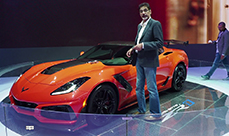The Man Who Dreams Of A Camry Convertible
Interviewing The Man Who Made The 2012 Camry
By Imthishan Giado
It’s never easy to follow up a hit. Just ask Michael Bay (but don’t watch any of his films). Budgets skyrocket, but so do expectations. Keichi Yoneda was the man given the unenviable task of creating a followup to a car that accounts for an incredibly significant proportion of Toyota’s sales worldwide. Click through to find out how he did it – and a little bit of his naughty side, as well.
It takes a while to get a laugh out of polite, polished Keichi Yoneda, but it’s worth it. The typically soft-spoken Japanese Deputy Chief Engineer for the Camry project is speaking to me at the tail end of a long day of media interviews, during which he’s undoubtedly been asked the same questions, ad nauseam. So I got all the boring stuff out of the way first.
What were your main development objectives?
We have two objectives: to produce midsize sedan in the market as Toyota’s backbone vehicle. Second: to refine Toyota’s quality, durability and reliability.
Which cars do you believe present the strongest competition to the Camry at present?
Everyone are our rivals, but we focused on the Fusion and the Accord. What impressed about these cars is their handling, fuel consumption. After Sonata made its big model change, we focused on that car as well.
Many rivals like the Sonata are now pursuing direct-injection technology for more powerful engines, others like the Fusion will go down the turbo route. Will either of these appear on a Camry soon?
We have a V6 sister car in the Aurion which will be coming. We have no plans for a V6 engine in the Camry, as we have the Aurion. Direct-injection is quite expensive technology and including it would increase the price.
Basically we are aiming for number one in the world without needing a direct-injection engine. We will pursue this course as far as possible, but in the future, I think we’ll have to introduce direct-injection.
Is the V6 engine dead in the midsize segment?
As long as we talk about the North American market which is the biggest market for Camry, we think that a V6 will be necessary. As far as the Middle East is concerned, customers are not too much concerned about fuel economy and the price of petrol.
Rather, they demand more power and performance, that’s why the V6 is necessary here – as Aurion.
You have considerable improvements to the base handling of the Camry. Was there a car you had in mind as a benchmark?
I have been in charge of the Lexus product planning before, and also tried many Mercedes Benz and BMWs for this test. Not only mid-size class sedans; I also tried to achieve in higher classes like a Lexus would.
Looking forward – do you see the Camry downsizing?
In the years, the competition will be based around fuel economy. As far as Camry is concerned, there will be no reduction; the car will stay its current size.
In the current midsize segment, the current car has the right level of spaciousness.
Did you perform any testing here?
This time we did not do any testing in the Middle East. Most of our testing was done in Japan.
Since we have a lot of experience operating in the Middle East for a long time, we have enough information to be able to realise these conditions in Japan. However, people in the Middle East have different tastes, so we made sure to allow people from this region to test the car before launch. Their feedback suggested two priorities; the first is reliability. The second is air-con performance.
What sort of testing regime did you put the car through?
Total mileage reached to more than 500,000km. We have our own facility to test cars for durability, which has around 37km of track. After 37 kilometres of that harsh test course, we have confidence that only a Toyota would survive. It’s very severe!
In terms of environmental conditions, what is currently your most demanding test market?
At this moment, Russia is now emerging as a market for us for Camry. So now we are getting experience about the conditions there. It’s the only place where a vehicle must run in -50 degree temperatures.
Japan is no comparison – it’s hotter than Russia!
Will you ever build a sporty halo model for the range?
Of course as a chief engineer, I would like to develop something like this. However the Camry is made for the people who can rely on the car. That’s a second target.
But I would like to develop a Camry Convertible, if the company allows!







